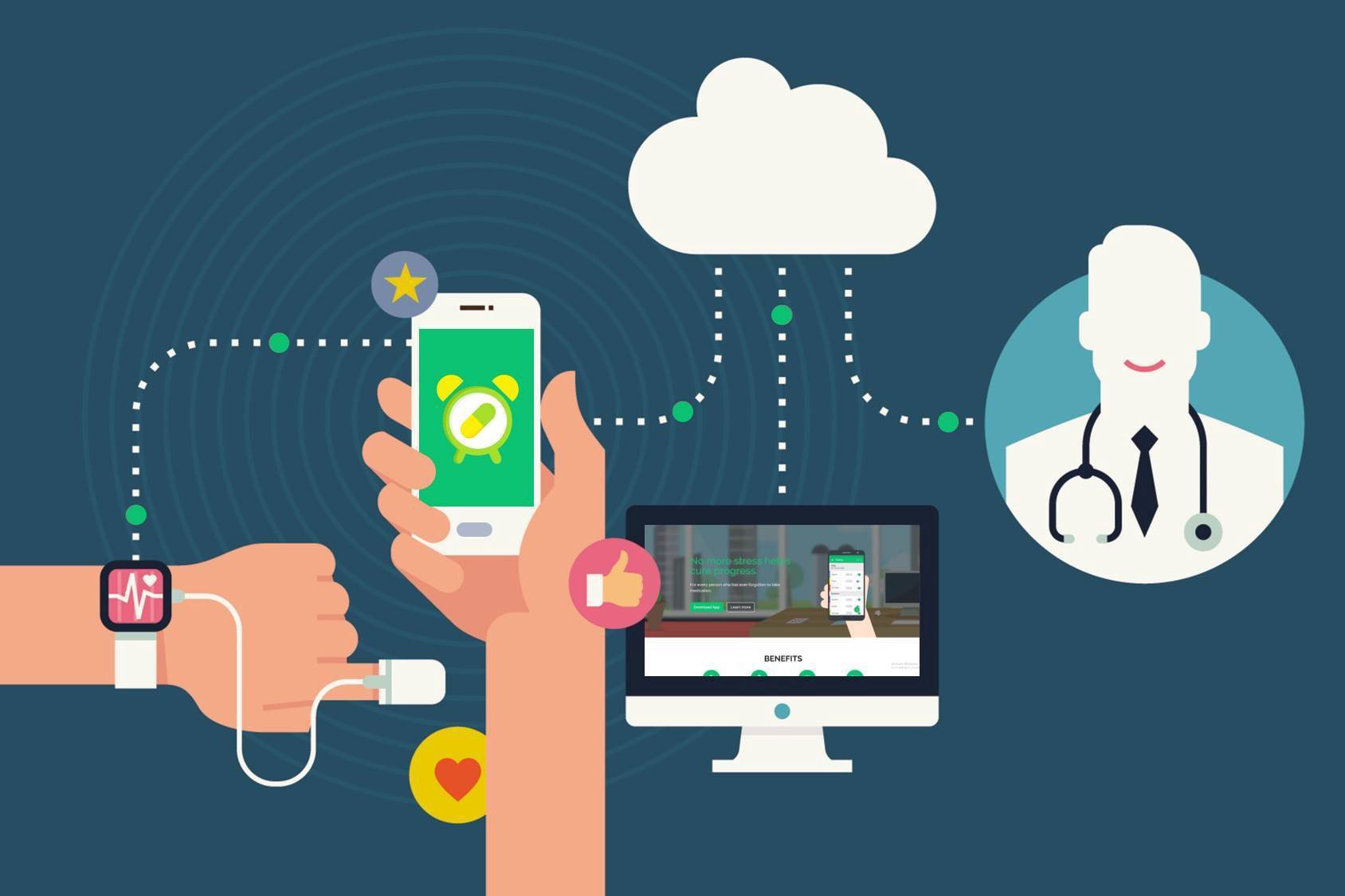What is Digital Healthcare and How Does it Affect Patient Care?
Answered on this page:
- What is digital healthcare?
- What technologies are driving the digital revolution in healthcare?
- How does digital healthcare impact patient care?
- What does the future hold for digital healthcare?
Digitization and the implementation of new and innovative technologies over the past decades have created sweeping changes across industries and around the world. Digital technology has changed the way we manage and access our finances, how we shop for everything from homes to household items and how we communicate. We can point to innovations like the Internet and mobile phones as major factors that changed the way organizations do business.
In 2019, the global digital revolution is continuing with the growing presence of connected devices, artificial intelligence applications, cloud computing and the Internet of Things (IoT). These applications of digital technology are being leveraged to produce efficiency gains in supply chain management, logistics, home security and convenience – but perhaps most impact-fully – in healthcare.
The healthcare industry has been notably sluggish when it comes to adopting the latest and greatest digital technology, but with a number of new innovations in digital healthcare promising to improve the patient experience and enhance patient care outcomes, an increasing number of medical professionals and healthcare administrators are recognizing the benefits that digital technology can provide. In this article, we’ll explain more about digital healthcare and how digital technology is being used to enhance patient care and improve outcomes.
What is Digital Healthcare?
When we think about digital healthcare, what we’re really thinking about is the application of digital technology to the healthcare environment. This includes things like:
- Electronic Medical Records – The EMR mandate was signed into law on January 1st, 2014 and requires all healthcare facilities and hospitals to demonstrate meaningful use of electronic health records in tracking and updating patient data.
- Telemedicine – Healthcare providers in the United States are already offering Telemedicine services to their patients. Telemedicine allows patients to meet with doctors remotely using the video conferencing applications on their smart phones. Physicians can follow up with their patients, diagnose certain kinds of illnesses and even write an e-prescription and have it sent to a pharmacy near the patient.
- Wearable Monitoring Devices – A patient recovering from surgery might be kept at the hospital for 3-4 days to monitor their vital signs and ensure they are recovering adequately before they are discharged. Today, patients can go home early with a wearable device that monitors their vital signs and alerts the attending physician if anything abnormal happens. The hospital can then use a bed for someone else that needs it while the patient recovers comfortably in their own home.
- Big Data – Big data has a lot of potential to enhance patient outcomes in healthcare. Hospitals can use predictive analytics to anticipate when there will be high volumes of patients, staffing themselves according to achieve the desired standard of care. Hospitals that can collect and analyze patient data in real-time may be able to prevent an infection from spreading through their facility.
- Artificial Intelligence – Artificial intelligence applications will play an increasing role in the way that certain health issues are diagnosed and treated over the next decade. Using machine learning, developers have been able to teach AI applications to detect and identify patterns in medical images and use them to help doctors make a diagnosis. AI applications are also being used to detect diseases in blood samples and even to determine whether a patient might have cancer.
- Connected Devices – The emergence of the IoT over the past decade has created new opportunities for connected devices in the healthcare space. Medical device companies are building digital-enabled products with internet connective capabilities that can transmit patient data, automatically update patient records, send alerts to doctors and more.
Digital healthcare represents a new way of thinking about healthcare delivery that seeks to leverage the technologies of today to their full extent in providing the best service to patients. Healthcare providers, healthcare administrators and hospital IT professionals can also benefit from innovations that lower hospital operating costs, streamline work flows, provide more timely information to care providers and enable a higher standard of care for patients.
Digital Healthcare: How Technology Has Improved Healthcare
The digital healthcare revolution is already challenging the traditional paradigm of healthcare service delivery, changing the way patients interact and engage with the healthcare system and improving outcomes for patients. As the healthcare industry continues to adopt digital healthcare technologies, patients are poised to be the primary beneficiary of lower costs and an increased standard of care. Here are just some of the ways that digital healthcare is affecting patient care in 2019.
Digital Healthcare Enables Access to Care for Remote Patients
Innovations in digital healthcare are enabling access to healthcare services for patients in remote locations who otherwise might be unable to see or meet with a doctor on a regular basis. With the use of Telemedicine, anyone with a phone line and an internet connection can have the opportunity to consult with a doctor. Telemedicine services are especially important for remote patients who require specialist care that may not be available in their town.
In addition to enhanced services for remote patients, telemedicine offers everyone the opportunity to receive more convenient healthcare. A low-income worker who falls sick might be able to see a doctor and get a prescription with a quick 20-minute telemedicine appointment on their lunch break rather than taking the day off work, commuting to the doctor’s office, and sitting in a waiting room to receive the same service.
Digital Healthcare Makes Healthcare Convenient for Patients
Healthcare is a highly competitive industry, and digital healthcare is introducing new ways for patients to customize their care and find more convenient options for health services that suit their needs, budget and schedule. Healthcare providers can use digital technology to gain a competitive advantage in serving the needs of patients, for example, by allowing patients to set up doctor’s office appointments using a mobile application rather than by phone.
Patients are the customers of healthcare, and digital healthcare will create new opportunities for patients to exercise their consumer choice in choosing healthcare providers and services that work for them.
Digital Healthcare Enables Data Sharing and Collaborative Patient Care
The introduction of the EMR mandate in January 2014 required healthcare providers to demonstrate meaningful use of electronic medical records. In the past, physicians kept track of patient interactions by charting information on paper and maintaining massive filing systems that were vulnerable to fire, flood and theft. In addition, records were difficult and inconvenient to share with other healthcare providers, and things like sloppy handwriting could easily lead to prescription mistakes and other preventable errors.
With the EMR mandate in full effect, many hospitals and healthcare facilities now maintain electronic medical records that can easily be shared between care providers, making it easier to coordinate patient care between physicians and to access a patient’s medical records when required in case of an emergency. In the future, hospitals may create a central repository of EMR data that can be updated automatically with information from connected devices and mined for data insights that can drive predictive analytics.
Summary
When we think about how technology has improved healthcare and how it will continue to do so in the coming years, digital healthcare is at the forefront. Through the application of digital technologies, physicians will produce more accurate patient diagnoses, hospitals will operate more efficiently, and big data will be used to predict and prevent the spread of infections in hospital populations.
On the patient side, patients will begin to see themselves as customers of healthcare and will have more options to access healthcare services that are convenient and affordable for them. Remote patients will enjoy better access to care and EMRs will help support better coordination of care for patients.






